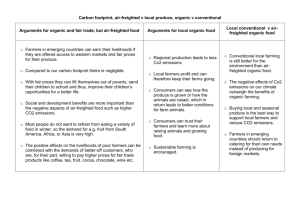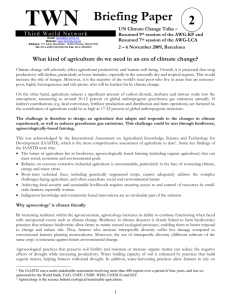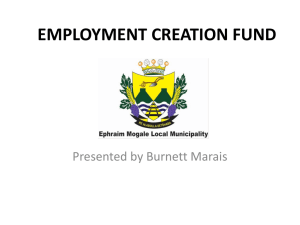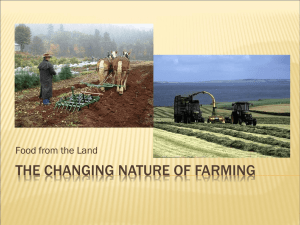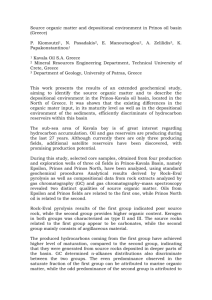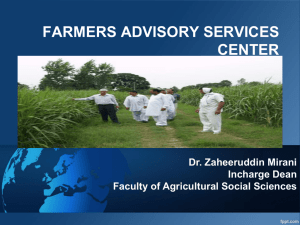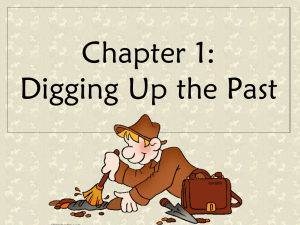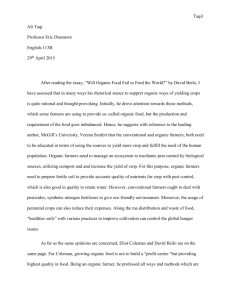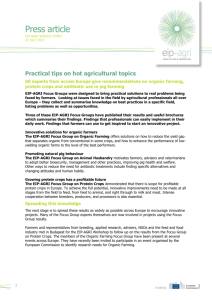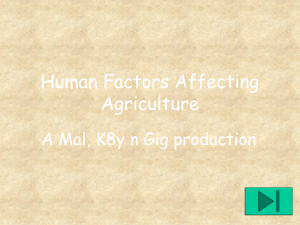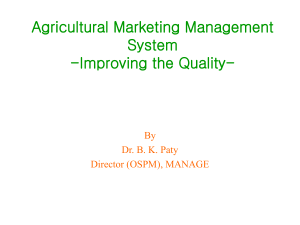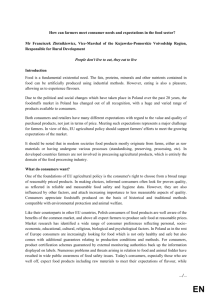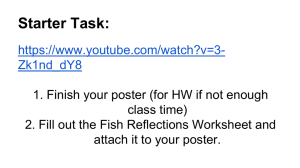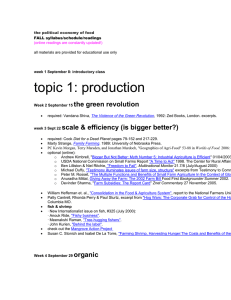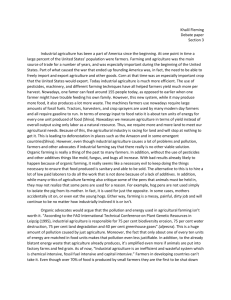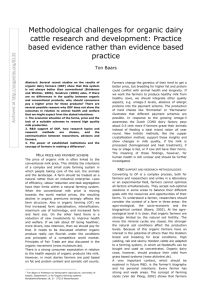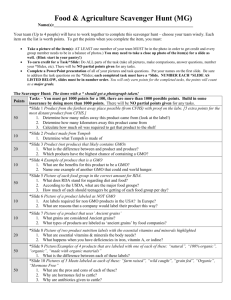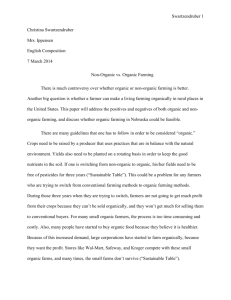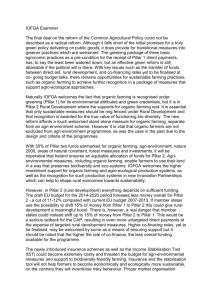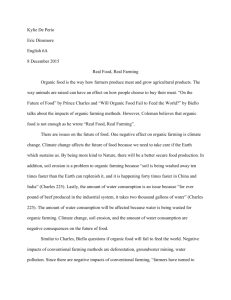Environmental Sustainability Concession Room at Warren Alvarado
advertisement
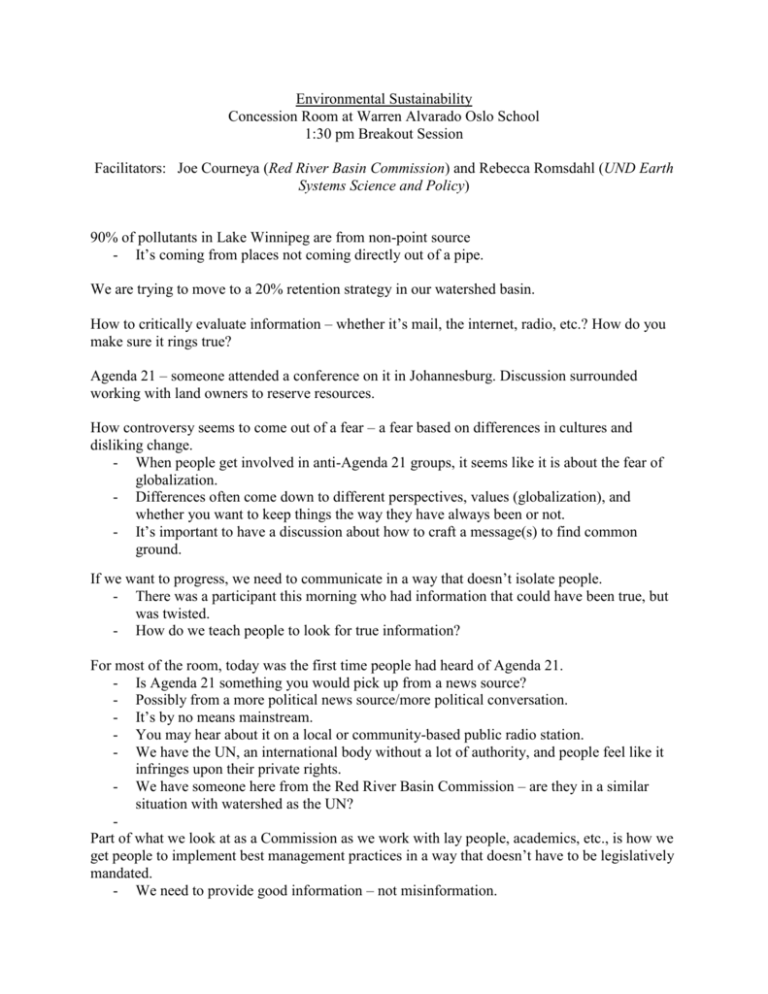
Environmental Sustainability Concession Room at Warren Alvarado Oslo School 1:30 pm Breakout Session Facilitators: Joe Courneya (Red River Basin Commission) and Rebecca Romsdahl (UND Earth Systems Science and Policy) 90% of pollutants in Lake Winnipeg are from non-point source - It’s coming from places not coming directly out of a pipe. We are trying to move to a 20% retention strategy in our watershed basin. How to critically evaluate information – whether it’s mail, the internet, radio, etc.? How do you make sure it rings true? Agenda 21 – someone attended a conference on it in Johannesburg. Discussion surrounded working with land owners to reserve resources. How controversy seems to come out of a fear – a fear based on differences in cultures and disliking change. - When people get involved in anti-Agenda 21 groups, it seems like it is about the fear of globalization. - Differences often come down to different perspectives, values (globalization), and whether you want to keep things the way they have always been or not. - It’s important to have a discussion about how to craft a message(s) to find common ground. If we want to progress, we need to communicate in a way that doesn’t isolate people. - There was a participant this morning who had information that could have been true, but was twisted. - How do we teach people to look for true information? For most of the room, today was the first time people had heard of Agenda 21. - Is Agenda 21 something you would pick up from a news source? - Possibly from a more political news source/more political conversation. - It’s by no means mainstream. - You may hear about it on a local or community-based public radio station. - We have the UN, an international body without a lot of authority, and people feel like it infringes upon their private rights. - We have someone here from the Red River Basin Commission – are they in a similar situation with watershed as the UN? Part of what we look at as a Commission as we work with lay people, academics, etc., is how we get people to implement best management practices in a way that doesn’t have to be legislatively mandated. - We need to provide good information – not misinformation. - - - Tile drainage is one of the biggest areas we work with o working with NRCS o educating about getting cost share up front o making the extra investment o and also thinking longer term if you’re the producer and we are going to have a dry phase, they have the control to hold back some water so they can keep their crops watered Restructuring or redesigning systems o we look at how we can educate tile drain companies, consumers, institutions who look at water quality and quantity, and how we can get the message out as a Commission There is not enough science out there A lot of the areas that used to be small grains in the Devils Lake area are now going to corn. How do you counteract changes taking place like that? Joe knows from personal research and experience about how agriculture can change migrations, etc. - Additionally, putting in wind towers has an impact on the living community (birds, bats, etc.) What do things like wind towers do to long term sustainability? - Another example, Fargo is working on a diversion, and that will impact regions north and south of the area. - We may have personal opinions, but we have to be careful as organizations to respect other perspectives. Do we have to take a look at how we are farming? Is this even on people’s radars? How do we get discussions like that started in communities? We need to not target one group or the other. - Because we are in an agricultural region, farmers are doing a lot with precision agriculture. - One of the challenges is that our farming population is aging. - Adopting new and different practices can be difficult – they are like the rest of us – if it is not easy to do they will not do it. - Taking away where we are each coming from and what we are contributing the system. - The gentleman with the cattails – that was his perspective for 60 to 70 years of his life. - Systems of bioenergy can be difficult for people to adapt. Isn’t that kind of what the problem is? People never look at the ripple effect. How do you get people to look at something? Just because it isn’t happening in your back yard does not mean it isn’t happening? How do we engage people in thinking ahead? So much of what happens on the landscape is driven by federal policy. - You cannot blame farmers for what they are doing – they are only doing what makes sense with the federal landscape put before them. Local individuals and communities need to have a discussion about what a ‘farmer’ is. There are probably a number of acres within the Red River Valley that have a multinational agenda. Critically evaluating information starts with ?? We need to find a way to have conversations about difficult subjects. It may have something to do with the political divide in the country right now. Most of the people in this room are from a university. When you go to a small town like this, and someone brings a map forward with a concern, what is an appropriate way to handle that situation? - We don’t want to come out with a judgmental response, want to come up with something that doesn’t close down the communication. You have to find leaders in your community. Find people who can speak the same language to bridge the ideas – suggestion that these people are called “community leaders” Solve problems instead of winning arguments –simple motto but would go long way. What is the connection between organic farming and ?? - Organic farmers are still successful businessmen. - North Dakota is #2 with organic acres behind California. - There is a commission in North Dakota for organic farmers that has only met once since a new ag commissioner was put in place. - There is a disconnect. We need support for organic farmers like regular farmers get. 58 – average age of farmer in US. How can we replace these big huge farmers? - Organic, whole food market – similar to farming 100 years ago – not so much profitbased, but community-based. - Example of Madison, WI, where there is a strong network of organic farmers with festivals, other events to support organic farming. - The demand needs to come from consumers. There is a lot of economic development potential behind this. How broad is the charge of the Red River Basin Commission? - Engaging consumers in a discussion about what’s available to eat in the Red River Basin - land use – so that people can try and walk with each other and develop perspectives. How do you build and/or maintain trust if a person has the perception that other people at the table are adding to their problem? - Bringing the sense of consensus – finding a solution that does not exist. - Instead of shooting for ‘the’ solution, shoot for what we can achieve best right now with every actor around the table. - We don’t bring a solution – we all need to be at the table and have a discussion. We have borders, but we live in a system. We have become a system that throws everything away. - All of our systems are dated systems – agriculture, education. - That’s part of building communication and not getting stuck. As individuals – we have the power of choice no matter what regulations or policy says. - We have to make decisions about what resources we use. Example of law in North Dakota recently passed saying 80 acres or less don’t need a permit to put in tile drains – there will be many orders of 79 acre areas putting tile drains in to avoid this. What do we value in terms of property rights? - Europe can see and appreciate the concept of limits. - We react to events rather than processes. - Example of glacier melting time lapse documentary. MN Dept of Ag “Discovery Farms” – what about the concept of working with systems we already have “Discovering Communities” to develop a community model that works that we are all working at that showcases our work.
